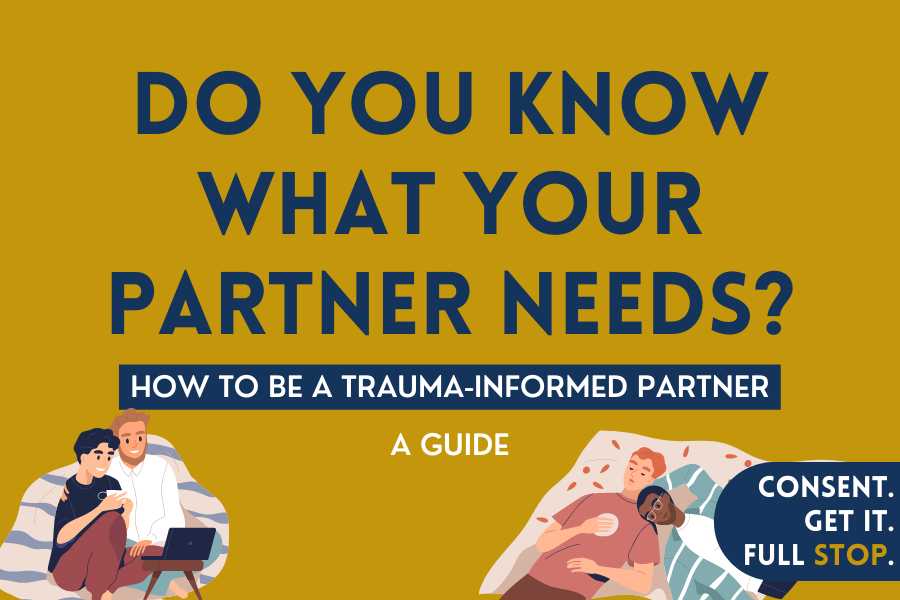Do you know what your partner needs?
We all have different experiences with sex, intimacy, and sexual relationships. You cannot be certain that all your partner’s past experiences were positive, so keep this in mind and approach your relationships in a trauma-informed manner.
In this article we offer you some tips on how you can do this!
Communication is key.
But not everyone is ready to share.
It is important to try to create and cultivate a safe physical and emotional space to share with your partner, so you can both feel comfortable to talk to each other more openly. If you can have the courage to be open and communicative about your likes and dislikes and needs, it will help your partner(s) to do the same when they are ready.
How to be a trauma-informed partner:
Understand trauma:
Acknowledge that upsetting events can have a long-lasting impact, even if it isn’t apparent in someone’s daily demeanour.
Trauma affects the nervous system, so the kind of responses it might provoke in certain situations are not always ones that your partner can control.
Knowing this will help you frame their behaviour so that you don’t see some of these responses as always intentional, and understand that your partner doesn’t necessarily mean to upset you. Being mindful of this can help you and your partner understand what triggers such reactions and how together you can regulate them. Check out this video by the NHS on how trauma affects the brain. [Link “Trauma and the Brain” video by NHS]
Be observant:
People don’t always communicate verbally. Paying attention to your partner’s body language will help you recognise when to slow down, step back and take action if their feelings escalate.
Promote open dialogue
If you feel like you can, try to discuss with your partner what you both like, don’t like, and anything you are open to trying sexually. You can also talk to them about what can help when they feel overwhelmed.
Check in with your partner during sex!
This can include:
- Agreeing on safe words or another form of communication to stop sexual activity.
- Reassuring your partner(s) that you can stop at any time. Consent can be withdrawn.
- Every now and then asking “Do you like this?” or “Is this still ok?”
- Being prepared to stop.
Learn some grounding techniques:
In recognising a trauma response, you can try using some techniques to ground them back to the present such as:
- Reminding them that they are safe
- Referencing the present date, location and other immediate sensations, such as sights and sounds.
- Offering a glass of water – this has been shown to help stop flashbacks
With care and calm, you can help to do something really important for a parter who has had traumatic experiences in the past – rebuild confidence. We cannot rid our loved ones of all harm caused by trauma; but, with patience and understanding, we can do our best to minimise it.
Further resources:
- “Trauma and the Brain” video by NHS
- “The Body Keeps the Score” by Bessel van der Kolk
- @ILANATALKS3X on Instagram
- Loving a Trauma Survivor: Understanding Childhood Trauma’s Impact On Relationships
- Trauma and Relationships: How to Help a Partner with a Trauma History
Written by Filipa Paes, third year student, 6.1.22
Read more about the University of Kent’s sex-positive campaign to cultivate and strengthen a culture of consent in our community of staff and students.
Check out further articles on Consent and Support and Wellbeing.

